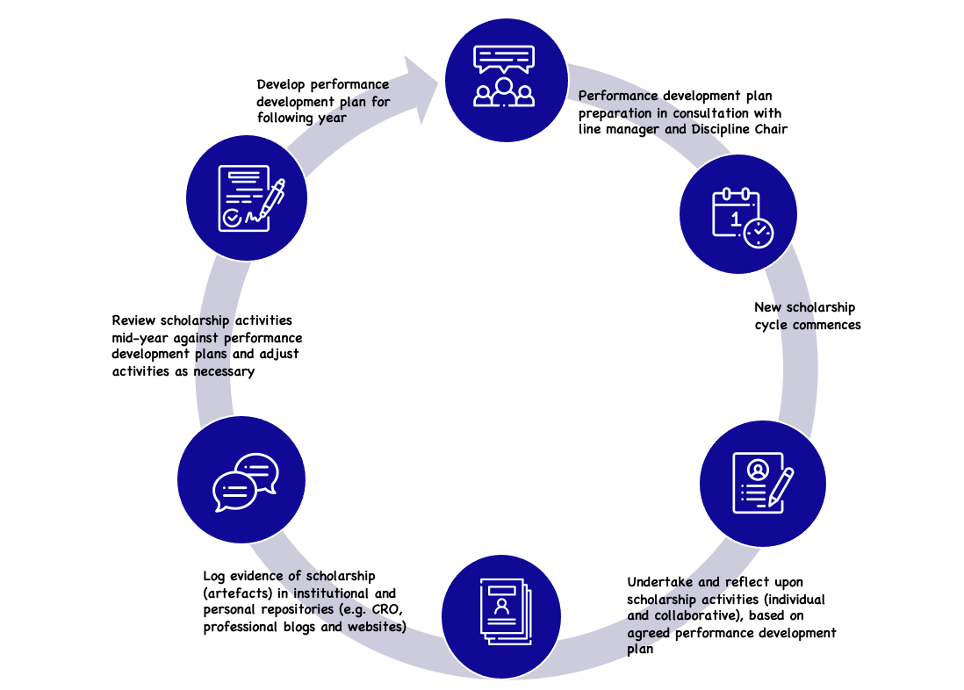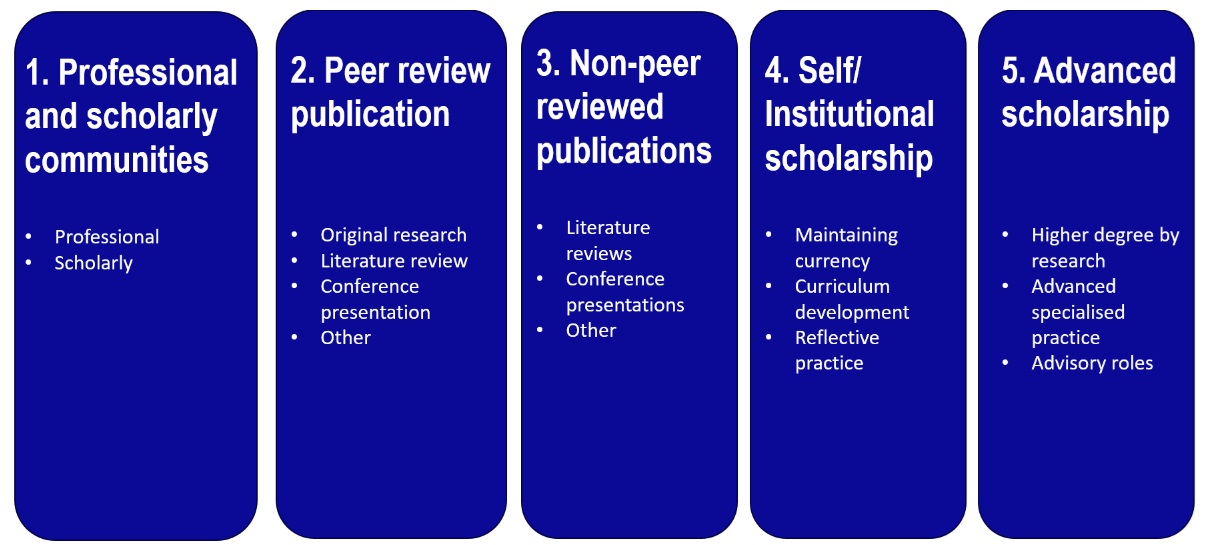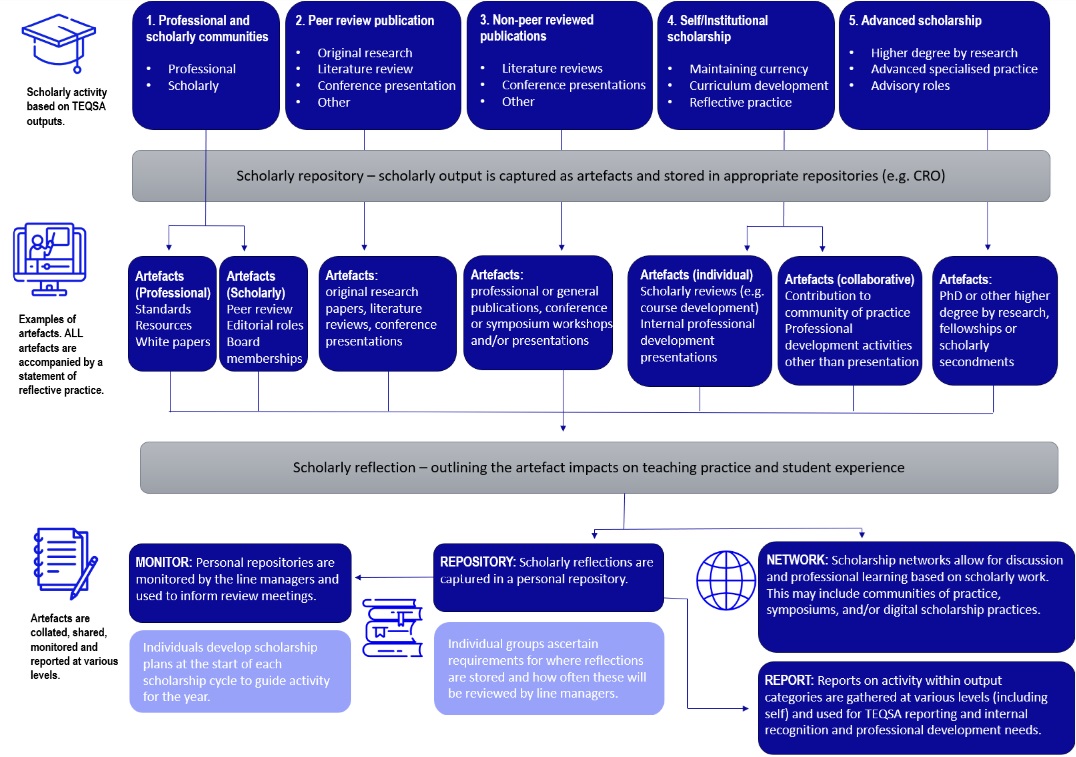Table of contents
- What does scholarship encompass?
- Positioning ACAP’s scholarship agenda in the HESF 2021
- ACAP Scholarly Activity Framework
- ACAP Scholarship Categories
- ACAP Scholarship Rating
- ACAP Scholarly Environment Model (ACAP SEM)
7. Human Research Ethics Committee (HREC)
The information on this page relates to scholarship in context to research and teaching. If you are looking for new and existing student scholarships, please visit this page.
1. What does scholarship encompass?
In the context of the Higher Education Standards Framework (Threshold Standards) 2021 (HES Framework), ‘scholarship’ refers to those activities concerned with gaining new or improved understanding, or appreciation and insights into a field of knowledge, or engaging with and keeping up to date with advances in the field.
Engagement in scholarship can be considered:
- across a provider (e.g. policy frameworks, resource allocation, institutional expectations, staff development), or
- at the level of individual activity (e.g. part of an individual’s personal professional development, teaching, research or professional practice).
Various aspects are relevant to higher education, but a key component is that scholarship:
- advances knowledge or professional practice in a field, or
- transmits advances through contemporary approaches to teaching and learning, or research and training.
2. Positioning ACAP’s scholarship agenda in the HESF 2021
Part A of the Higher Education Standards Framework (Threshold Standards) 2015 (HES Framework) specifies a number of requirements involving inputs arising from ‘scholarship’, either directly or indirectly.
These include:
1. Scholarly underpinning of specified learning outcomes (1.4.2 a-d)
2. Research training outcomes (1.4.7)
3. Course design (3.1.2 a-c)
4. Staffing (3.2.3 a-b)
5. Research training environment (4.2.2).
The corporate and academic governance functions of a provider are also expected to have oversight of the broader academic activities of the provider, including the impact of scholarship on the provider’s academic activities (e.g. 6.2 f, 6.3).
Part B of the HES Framework also identifies scholarship as an essential characteristic of a higher education provider (Part B1.1.4 for a HEP, and for other types of provider in Parts B 1.2 – 1.4) and of a provider with self-accrediting authority for its courses (Part B3.d).
TEQSA’s Guidance Note describes ‘scholarship’ as ‘activities concerned with gaining new or improved understanding, appreciation and insights into a field of knowledge, and engaging with and keeping up to date with advances in the field. This includes advances in ways of teaching and learning in the field and advances in professional practice, as well as advances in disciplinary knowledge through original research.’
The HES Framework requires individual academic staff members in a provider to be engaged in scholarship (3.2.3). It also requires a provider to create and foster a scholarly environment for research training (4.2.2). Monitoring, review and improvement mechanisms are also required (5.3). As such, TEQSA will expect to see that the provider’s policies and practices collectively:
- define and engage with ‘scholarship’ in a manner consistent with the typologies and effects outlined above
- create an expectation of scholarship at the institutional level for all teaching/research staff
- create a culture of monitoring and evaluation of the outcomes of scholarship, with related monitoring instruments and processes to do so; and
- allow the provider to present an aggregate representation of the extent of its involvement in scholarship, including an overall plan that is monitored and reviewed (e.g. by an academic review committee, academic board or the like), for both progress and outcomes.
Scholarly activity is defined as the process of research leading to scholarly outcomes and the active participation in one’s discipline or in interdisciplinary work. Scholarship, particularly in higher education institutions must be framed in a way that it is inclusive of a range of scholarly activities. ACAP utilises the expanded definition of scholarship and research which classifies four types of scholarship as proposed by Ernest Boyer.
These include:
- scholarship of discovery which includes original research that advances knowledge,
- the scholarship of integration which includes synthesis of information across disciplines, across topics within a discipline or across time,
- the scholarship of application which involves the application of disciplinary expertise with results that can be shared external to the College, and
- the scholarship of teaching and learning which allows for public sharing and the opportunity for application and evaluation by others.
The scholarship of engagement, or the use of scholarship to understand and solve pressing social, civic and ethical problems is critical to ACAP’s mission.
As such, all permanent ACAP academic teachers must undertake scholarly activity that:
- encourages research and intellectual enquiry, critical thinking, and learning with practical relevance to ACAP
- informs and enhances learning and teaching
- develops professional capability
- reinforces reflection and continuous improvement
- provides dialogue with colleagues, professional bodies and industry
- focuses on student achievement of learning outcomes.

3. ACAP SCHOLARLY ACTIVITY FRAMEWORK
ACAP Scholarly Activity Framework is integrated within the annual performance development plan. The framework is modified from the Psychology Board of Australia Professional development framework. This Framework emphasises personal responsibility within a supportive professional development environment.
Within the Scholarly Activity Framework, academic teachers are responsible for developing and maintaining evidence of scholarly activities during the 12-month cycle. Evidence of engagement with scholarly activity ensures positive outcomes for staff, enabling them to further share knowledge and skills with their peers.
4. ACAP Scholarship Categories

5. ACAP Scholarship Rating
Ratings according to reach of scholarship (scale from personal to global with impact). Rating scores will be set during performance development planning and will be linked to level of appointment and weighting of scholarship and/or research approved in annual workload.
| 1 point | Transforms and impacts individual practice of learning and teaching |
| 2 points | Internally shared scholarship and impacts learning and teaching |
| 3 points | Impacts learning and teaching and is disseminated to external community/profession/industry |
| 4 points | National dissemination on practice of learning and teaching and impact OR international dissemination without peer review |
| 5 points | International dissemination and demonstrated impact on practice of learning and teaching |
1 |
|
2 |
|
3 |
|
4 |
|
5 |
|
6. ACAP Scholarly Environment Model (ACAP SEM)
The Scholarly Environment Model has been adopted from the Charles Sturt university model to provide guidance to the scholarly activity categories and collection of scholarship artefacts. The Scholarly Environment Model (SEM) draws from the TEQSA categories outlined in the TEQSA Scholarship Guidance note (V2.5, December 2018). It recognises:
- the different forms of scholarly activities
- the outputs that TEQSA might expect to see as evidence for the different forms of scholarly activities
- how networking opportunities could be used to help disseminate those outputs between academic staff
The Scholarly Environment Model informs the learning plan and scholarly activities undertaken in the Scholarly Activity Framework.

Categories and exemplar reflections
Professional and Scholarly Communities
These contributions should advance knowledge and/or practice. They may include contributions to discipline-based or learning and teaching professional bodies/communities of practice, such as:
- development of new standards
- knowledge resources or codes of practice
- contributions to scholarly communities, such as editorial roles or peer review.
Peer Reviewed Publications
These contributions must be peer reviewed, and can include:
- original research in a discipline or on teaching and learning practices
- literature reviews
- conference presentations.
Non-Peer Reviewed Publications
These contributions are made to non-peer reviewed publications or conferences, and can include:
- scholarly literature reviews
- presentations
- advanced professional development in a discipline or on teaching and learning practices.
Self/Institutional Scholarship
These contributions are to individual or collaborative (e.g. journal clubs, professional development activities) efforts to:
- remain abreast of developments in a field
- complete scholarly reviews of the current state of knowledge or teaching in a field to contribute to course/subject development.
Advanced Scholarship
This category focuses on advanced scholarship through higher level qualifications that lead to scholarly outputs, in particular:
- higher degrees by research
- undertaking specialised practice or scholarly secondments and/or formal advisory roles that may influence teaching activities.
